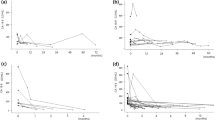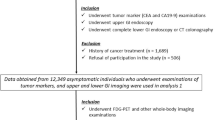Abstract
Serum carbohydrate antigen (CA15-3) values were examined in 300 normal subjects in order to determine the standard value of this antigen. The clinical relevance of repeatedly assaying this marker in patients with or without recurrent breast cancer postoperatively was compared with assaying the serum carcinoembryonic antigen (CEA) values. The upper limit of CA15-3 was calculated as being 25.3 U/ml in the normal subjects and the distributions of CA15-3 values were not markedly different among the normal subjects, even if they had been selected according to sex or age. Moreover, no differences were observed among normal women who had been randomly selected according to the age distribution of the breast cancer patients. Thirty samples taken from the breast cancer patients postoperatively revealed values of higher than 25 U/ml and 73 samples showed lower levels. The serum CEA values were positive in 16 samples and negative in 85 samples. Although the accuracy of the CEA assay was about 10 per cent higher than that of the CA15-3 assay, its low positive rate was unsatisfactory for effective use in the breast clinic. The results of this study suggest that serum CA15-3 is not detectable unless there is a relatively large number of tumor cells. The higher false positive rate of the CA15-3 assay should therefore be considered as suggesting recurrence.
Similar content being viewed by others
References
Tobias R, Rothwell C, Wanger J, Green A, Liu Y-S. V. Development and evaluation of a radioimmunoassay for the detection of a monoclonal antibody defined breast tumor associated antigen 115D8/DF3. Clinical Chemistry 1985; 31: 986. (Abstracts of the 37th National Meeting of AACC, Atlanta, Georgia, 1985)
Gang Y, Adachi I, Ohkura H, Yamamoto H, Mizuguchi Y, Abe K. CA15-3 is present as a novel tumor marker in the sera of patients with breast cancer and other malignancies. Gan to Kagaku-Ryoho (Jpn J Cancer Chemother) 1985; 12: 2379–2386. (English Abst).
Ogawa T, Izuo M, Morita H, Ishida T, Iino Y, Hoshino K, Suzuki H, Murata S, Matsuzaki S, Suzuki M. Evaluation of a tumor-associated antigen CA15-3 in the sera of patients with breast cancer. Gan no Rinsyo (Jpn J Cancer Clin) 1986; 32: 27–32. (English Abst.)
Sakurabayashi I, Kawai T, Kawaguchi R, Yonezawa M. Clinical evaluation of a cancer antigen CA15-3 associated with breast cancer. (I) Modification of its method and reference values. Clin Pathol 1986; 33: 53–58.
Iizuka Y, Kume H. A new procedure for determining the normal range. Clin Pathol 1979; 27: 158–161.
Hilkens J, Buijs F, Hilgens J, Hageman PH, Sonnenberg A, Koldovsky U, Karande K, Van Hoeven RP, Feltkamp C, Van De Rijn JM. Monoclonal antibodies against human milk fat globule membranes detecting differentiation antigens of the mammary gland. Protides of the Biological Fluids 1984; 32: 813–816.
Hilkens J, Krozen V, Bonfer JMG, Bruning PF, Hilgers J, VanEijkeren M. A sandwich-radioimmunoassay for a new antigen (MAM-6) is present in the sera of patients with metastasized carcinomas. Protides of the Biological Fluids 1984; 32: 651–653.
Kufe D, Inghirami G, Abe M, Hayes D, Wheeler HJ, Schlom J. Differential reactivity of a novel monoclonal antibody (DF3) with human malignantversus benign breast tumors. Hybridoma 1984; 3: 223–231.
Hayes DF, Sekine H, Ohono T, Keet K, Kufe DW. Use of a murine monoclonal antibody for detection of circulating plasma DF3 antigen levels in breast cancer patients. J Clin Invest 1985; 75: 1671–1678.
Cohen C, Sharkey FE, Shulman G, Uthman EO, Budgeon LR. Tumor-associated antigens in breast carcinomas. Prognostic significance. Cancer 1987; 60: 1294–1298.
Waalkes TP, Enterline JP, Shaper JH, Abeloff MD, Ettinger DS. Biological markers for breast carcinoma. Cancer 1984; 53: 644–651.
Putzki H, Student A, Jablonski M, Heyman H. Comparison of the tumor markers CEA, TPA, and CA19-9 in colorectal carcinoma. Cancer 1987; 59: 223–226.
Author information
Authors and Affiliations
Rights and permissions
About this article
Cite this article
Kobayashi, S., Iwase, H., Karamatsu, S. et al. The clinical value of serum CA15-3 assay postoperatively in breast cancer patients. The Japanese Journal of Surgery 19, 278–282 (1989). https://doi.org/10.1007/BF02471402
Received:
Issue Date:
DOI: https://doi.org/10.1007/BF02471402




